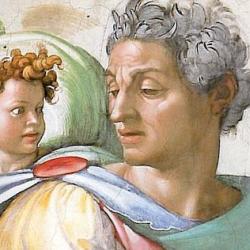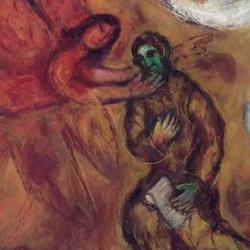Isaiah’s name contains a form of the verb yasha, “save,” like the names Joshua and Jesus. Isaiah means “Yah saves.” Isaiah’s name is a clue to one of the key themes of the book.
Again and again, Isaiah repeats the ringing declaration that Yahweh is Savior, and each time he is expounding on the meaning of his own name.
*12:2: When Judah is saved, Judah will sing: God is my salvation; I will trust and not be afraid; for Master Yahweh is my strength and my song; He also is become my salvation.
*25:9: This is our God; we have waited for Him, and He will save us; this is Yahweh; we have waited for Him, and we will be glad in His salvation.
*30:15: Thus says Master Yahweh, the Holy One of Israel: In returning and rest you shall be saved; in quietness and confidence shall be your strength.
*33:22: Israel will confess that Yahweh is God: Yahweh is our judge, Yahweh is our Lawgiver, Yahweh is our King; He will save us.
*35:4: Say to them that are of fearful heart: Be strong, fear not; behold your God will come with vengeance, God with a recompense; He will come and save you.
*37:35: When Jerusalem is threatened, Yahweh Himself declares: I will defend this city to save it for my own sake, and for my servant David’s sake.
*43:3, 11: He is uniquely the Savior: I am Yahweh your God, the Holy One of Israel, Your savior. . . . I, even I am Yahweh, and beside Me there is no Savior.
*45:21: Have I Yahweh not said that there is no God beside me, a just God and a Savior; none beside Me.
*60:16: When Judah is delivered from the Gentiles, and Gentile kings are like nursing mothers to Israel, then You shall know that I Yahweh am Your Savior and Your redeemer, the Mighty One of Jacob.
The word “save” appears in different forms 48 times in Isaiah’s prophecy, more than in any other book of the Old Testament except the Psalms. He uses the word “salvation” 19 times (Hebrew is yeshua, Jesus), and the verb – sometimes as the verb “save” and sometimes as the participle “Savior” occurs 29 times. Isaiah’s prophecy announces a 48-fold salvation, a salvation that multiplies through all the 12 tribes and to the four corners of the land.
And that doesn’t even count the 24 times – 24! – that Isaiah uses the related word go’el, which means “Redeemer.” This is the word used for the kinsman-redeemer in the law, the close relative who buys his brother out of slavery, raises up children so that his brother’s name will continue, avenges his brother’s death. Yahweh says that He is the kinsman-redeemer for Israel; He is the brother, the near relative who will deliver them.
Yahweh saves. That’s Isaiah’s name; that’s Isaiah’s message. Three times, Yahweh saves Judah from death. He saves them from Israel and Aram; He saves them when Samaria falls; He saves them from Sennacherib.
But they remain arrogant, insolent, refusing to listen. They are headed to eventual death, and the question that hangs over Isaiah is whether Yahweh can save them even from that.
Suppose Judah were to die, collapse; supposed Judah were to go the way of the northern kingdom, scattered among the nations, an end to the Davidic dynasty. Is Yahweh capable of delivering them? That’s the question of the last part of the book. He can save while Jerusalem still stands, while the temple stands, while there is a Davidic descendant on the throne of Jerusalem. Can He save when all that has been cleared away?
Isaiah’s answer is, Yes. It’s even more: It’s, You ain’t seen nothing yet. Forget about the exodus; forget about the deliverance of Jerusalem from Sennacherib. Forget about the former things. Yahweh’s going to do something new, something unprecedented. Judah will go to exile in Babylon. Judah will die. But Judah will rise again. How?
Yahweh, the God of Israel, throws down one kingdom and raises up another. He’s done it with Assyria, and He’ll do it with Babylon. He’ll raise up the Persians, with Cyrus at the head, to overthrow Babylon and to send Israel go. Yet another empire will rise that will end the Babylonian empire and send Judah back home.
He’ll do this because He is the Creator God, the only God there is. The later chapters of Isaiah are full of polemics against the gods of the nations, polemics against idols. Yahweh humiliates the gods, mocks them, and proves that He is the one true God by bringing Israel back to the land.
And not only will He lead Judah back, but He will restore Jerusalem, and Jerusalem will become an even greater city than ever, rising up as the chief of the mountains, the true high place, the true lofty place on the earth.
Even more, when He does that for Judah, it will not only show Judah that He is their God, but it will demonstrate to the nations that Yahweh, the God of Israel, is the Creator of heaven and earth. He will be glorified among all nations when He raises Israel up from death back to new glorious life.
And all this will happen because Yahweh will prove Himself the God of forgiveness, of grace.
*“Comfort, comfort my people, says your God. Speak tenderly to Jerusalem, and cry to her, that she has served her term, that her penalty is paid, that she has received double from the Lord’s hand for all her sins.”
*“For a brief moment I abandoned you, but with great compassion I will gather you. In overflowing wrath for a moment, I hid my face from you, but with everlasting love I will have compassion on you, says Yahweh, your Redeemer.”
*“I, I am He, who blots out Your transgressions for my own sake, and I will remember your sins no more.”
*“I have swept away your transgressions like a cloud, and your sins like mist.”










